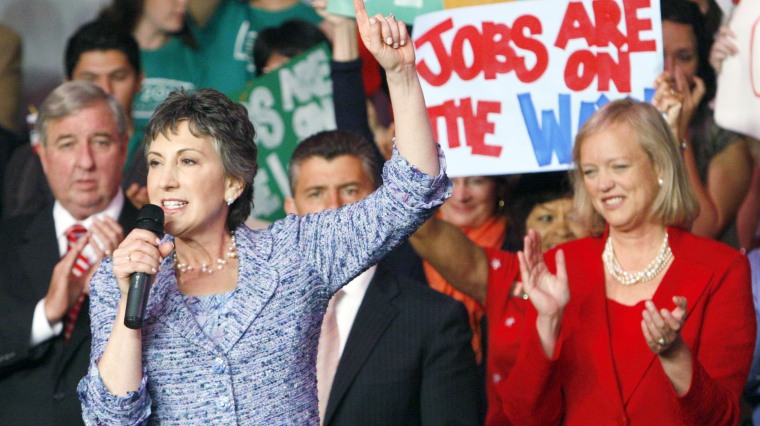As Meg Whitman, California's new Republican gubernatorial nominee, puts it, she and GOP Senate pick Carly Fiorina are the "worst nightmare" of career politicians: "two businesswomen from the real world who know how to create jobs, balance budgets and get things done."
Is she right? There is a long history of executives attempting to make the leap into public office, going at least as far back as industrialist Wendell Wilkie's bid to unseat Franklin D. Roosevelt in 1940. And there is much about the political environment in 2010 that would seem to make this election year a bull market for CEOs: Voters are eager to turn out officeholders; state and federal budgets are soaked in red ink; unemployment tops the list of public concerns in just about every poll. If only the government worked like a business, the executives-turned-candidates are fond of telling us, we'd all be better off.
The trouble is, by and large, CEOs have turned out to be pretty mediocre politicians.
Not that there hasn't been a success story every now and then: Michael R. Bloomberg, the billionaire Republican-turned-independent mayor of New York, or Democrat Mark Warner, who made a cellphone fortune before becoming governor and now senator from Virginia.
For every one of those, however, you can count many more such as onetime Northwest Airlines co-chairman Al Checchi, who parted with $40 million in 1998 to come in a distant second in the California Democratic gubernatorial primary. Or former Amway chief Dick DeVos, a Republican who shelled out $35 million in 2006, only to get creamed by an unpopular governor in Michigan. Or failed presidential contenders including data-processing billionaire Ross Perot in 1992 and 1996, and publishing magnate Steve Forbes in 1996 and 2000.
Even when they manage to get elected, CEOs often are surprised to learn that their skills in the boardroom do not easily translate to the business of governing. Former Goldman Sachs head Jon S. Corzine discovered this when he was ousted as New Jersey governor last year. "You don't have the flexibility you imagined. There's no exact translation," Corzine, a Democrat, later told Newsweek.
Warner agrees. "This notion that you're just going to run a government like a business — it's a lot easier said than done. Even as a [governor], you've got to build a lot more consensus than you do in the business world," he said.
Warner's tenure in Richmond was spent slashing budgets, raising taxes and seeing more than a few of his early proposals shrugged off by a Republican legislature. "It took a year-plus of getting the stuffing kicked out of me," Warner said.
Still, they keep trying. In addition to the two first-time candidates who will top the GOP ticket in California this year, there is Linda McMahon, former chief of World Wrestling Entertainment, the leading contender to take the Republican nomination for the Senate in Connecticut.
A long record in business is not always a benefit in a year when the state of corporate America is almost as woeful as that of government. Whitman, the former CEO of eBay, has fended off questions about her former role as a director of Goldman Sachs, the Wall Street investment bank that has been sued for fraud by the Securities and Exchange Commission. Fiorina's stormy tenure as the head of Hewlett-Packard included sending jobs overseas and ended with her ouster in 2005.
As for McMahon, the YouTube record of her hands-on management style in the ring — which includes a memorable scene in which she gets slapped by her daughter — is an oppo researcher's dream.
And for all their claims to be careful stewards of a dollar, many CEOs-turned-politicians often are freewheeling with their campaign budgets. In fact, what initially draws some executives to politics, and vice versa, is their ability to finance a bid for office out of their own checking accounts. That's not exactly the safest of investments, given that self-financed candidates almost always lose.
With so many executives running in 2010, "it's a good year to be a media buyer," deadpans Bloomberg's longtime political strategist, Kevin Sheekey.
Whitman has already shattered all spending records in California, having shelled out $71 million of her money to win the primary against Insurance Commissioner Steve Poizner, a former Silicon Valley entrepreneur who had chipped in $24 million of his.
She insists that the investment has been a judicious one, part of a plan that also includes "laying pipe" for her general-election battle against former governor Edmund G. "Jerry" Brown Jr. (D), who has spent most of his life in politics. "We are on budget, on strategy," Whitman said. "The difference, of course, is this is money we have raised from people who voluntarily want to invest in my campaign, as well as money I have invested in the campaign. So it is not taxpayers' money."
CEOs, used to getting their way and having underlings jump at their commands, can be ill-equipped for the slow, frustrating grind of politics: the go-nowhere meetings; the vote wrangling; the years to get the simplest thing done. Not to mention an end to the privacy they enjoyed behind their hedges in the Hamptons.
"It's a whole different language," said longtime Democratic consultant Tad Devine. "Many of them do get exasperated." As so many have learned the hard way, that often leaves voters feeling the same way about them.
